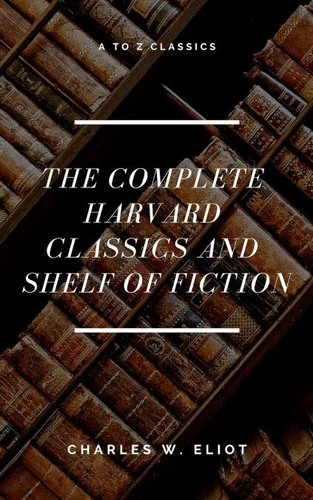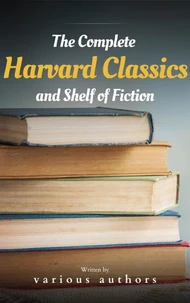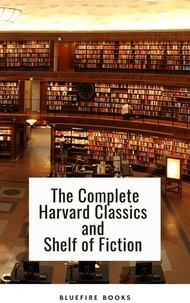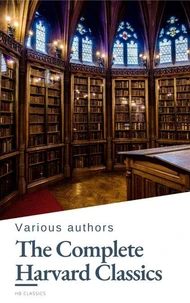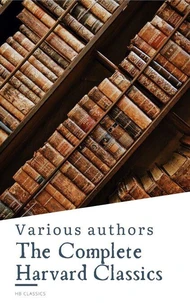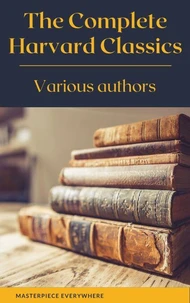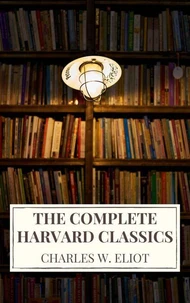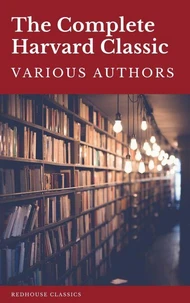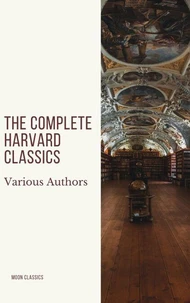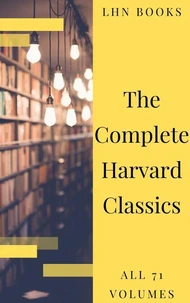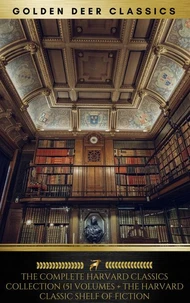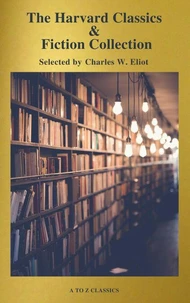The Complete Harvard Classics and Shelf of Fiction (A to Z Classics)
Par :Formats :
Disponible dans votre compte client Decitre ou Furet du Nord dès validation de votre commande. Le format ePub est :
- Compatible avec une lecture sur My Vivlio (smartphone, tablette, ordinateur)
- Compatible avec une lecture sur liseuses Vivlio
- Pour les liseuses autres que Vivlio, vous devez utiliser le logiciel Adobe Digital Edition. Non compatible avec la lecture sur les liseuses Kindle, Remarkable et Sony
 , qui est-ce ?
, qui est-ce ?Notre partenaire de plateforme de lecture numérique où vous retrouverez l'ensemble de vos ebooks gratuitement
Pour en savoir plus sur nos ebooks, consultez notre aide en ligne ici
- Nombre de pages40300
- FormatePub
- ISBN978-2-37926-107-7
- EAN9782379261077
- Date de parution15/01/2019
- Protection num.Digital Watermarking
- Taille34 Mo
- Infos supplémentairesepub
- ÉditeurMyBooks Classics
Résumé
( newly updated TOC )
The Harvard Universal Classics, originally known as Dr. Eliot's Five Foot Shelf, is a 51-volume anthology of classic works from world literature, compiled and edited by Harvard University president Charles W. Eliot and first published in 1909.
Eliot had stated in speeches that the elements of a liberal education could be obtained by spending 15 minutes a day reading from a collection of books that could fit on a five-foot shelf.
(Originally he had said a three-foot shelf.) The publisher P. F. Collier and Son saw an opportunity and challenged Eliot to make good on this statement by selecting an appropriate collection of works, and the Harvard Classics was the result. Eliot worked for one year with William A. Neilson, a professor of English; Eliot determined the works to be included and Neilson selected the specific editions and wrote introductory notes.
Each volume had 400-450 pages, and the included texts are "so far as possible, entire works or complete segments of the world's written legacies." The collection was widely advertised by Collier and Son, in Collier's and elsewhere, with great success. Eight years later Eliot added a further 20 volumes as a sub-collection titled 'The Harvard Classics Shelf of Fiction', offering some of the greatest novels and short stories of world literature.
The exhaustive anthology of the 'The Harvard Classics' comprises every major literary figure, philosopher, religion, folklore and historical subject up to the twentieth century.
(Originally he had said a three-foot shelf.) The publisher P. F. Collier and Son saw an opportunity and challenged Eliot to make good on this statement by selecting an appropriate collection of works, and the Harvard Classics was the result. Eliot worked for one year with William A. Neilson, a professor of English; Eliot determined the works to be included and Neilson selected the specific editions and wrote introductory notes.
Each volume had 400-450 pages, and the included texts are "so far as possible, entire works or complete segments of the world's written legacies." The collection was widely advertised by Collier and Son, in Collier's and elsewhere, with great success. Eight years later Eliot added a further 20 volumes as a sub-collection titled 'The Harvard Classics Shelf of Fiction', offering some of the greatest novels and short stories of world literature.
The exhaustive anthology of the 'The Harvard Classics' comprises every major literary figure, philosopher, religion, folklore and historical subject up to the twentieth century.
( newly updated TOC )
The Harvard Universal Classics, originally known as Dr. Eliot's Five Foot Shelf, is a 51-volume anthology of classic works from world literature, compiled and edited by Harvard University president Charles W. Eliot and first published in 1909.
Eliot had stated in speeches that the elements of a liberal education could be obtained by spending 15 minutes a day reading from a collection of books that could fit on a five-foot shelf.
(Originally he had said a three-foot shelf.) The publisher P. F. Collier and Son saw an opportunity and challenged Eliot to make good on this statement by selecting an appropriate collection of works, and the Harvard Classics was the result. Eliot worked for one year with William A. Neilson, a professor of English; Eliot determined the works to be included and Neilson selected the specific editions and wrote introductory notes.
Each volume had 400-450 pages, and the included texts are "so far as possible, entire works or complete segments of the world's written legacies." The collection was widely advertised by Collier and Son, in Collier's and elsewhere, with great success. Eight years later Eliot added a further 20 volumes as a sub-collection titled 'The Harvard Classics Shelf of Fiction', offering some of the greatest novels and short stories of world literature.
The exhaustive anthology of the 'The Harvard Classics' comprises every major literary figure, philosopher, religion, folklore and historical subject up to the twentieth century.
(Originally he had said a three-foot shelf.) The publisher P. F. Collier and Son saw an opportunity and challenged Eliot to make good on this statement by selecting an appropriate collection of works, and the Harvard Classics was the result. Eliot worked for one year with William A. Neilson, a professor of English; Eliot determined the works to be included and Neilson selected the specific editions and wrote introductory notes.
Each volume had 400-450 pages, and the included texts are "so far as possible, entire works or complete segments of the world's written legacies." The collection was widely advertised by Collier and Son, in Collier's and elsewhere, with great success. Eight years later Eliot added a further 20 volumes as a sub-collection titled 'The Harvard Classics Shelf of Fiction', offering some of the greatest novels and short stories of world literature.
The exhaustive anthology of the 'The Harvard Classics' comprises every major literary figure, philosopher, religion, folklore and historical subject up to the twentieth century.

